

History and Future of Higher Education. Concerned about the challenges facing higher education?
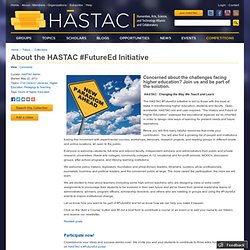
Join us and be part of the solution. HASTAC: Changing the Way We Teach and Learn The HASTAC #FutureEd Initiative is led by those with the most at stake in transforming higher education: students and faculty. Open, worldwide, HASTAC-led and user-inspired, “The History and Future of Higher Education” assesses the educational legacies we’ve inherited in order to design new ways of learning for present needs and future aspirations. Below you will find many helpful resources that invite your contribution. Everyone is welcome--students, full-time and adjunct faculty, independent scholars, and administrators from public and private research universities, liberal arts colleges, community colleges, K-12, vocational and for-profit schools, MOOCs, discussion groups, after-school programs, and lifelong learning institutions.
Let us know how you want to be part of #FutureEd and let us know how we can help you make it happen. Related posts Press: Influencers Debate: What’s the Future of Higher Education? When I was in high school, teachers described a simple path to success.
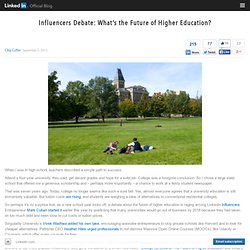
Attend a four-year university, they said, get decent grades and hope for a solid job. College was a foregone conclusion. So I chose a large state school that offered me a generous scholarship and – perhaps more importantly – a chance to work at a feisty student newspaper. That was seven years ago. Today, college no longer seems like such a sure bet. So perhaps it’s no surprise that, as a new school year kicks off, a debate about the future of higher education is raging among LinkedIn Influencers. Singularity University’s Vivek Wadhwa added his own take, encouraging wannabe entrepreneurs to skip private schools like Harvard and to look for cheaper alternatives. But to really understand what’s happening in higher education, I had to talk with Jeff Selingo, the editor at large at the Chronicle of Higher Education, and one of our most-popular Influencers. Readers: What’s your take? Www2.ed.gov/about/bdscomm/list/hiedfuture/reports/final-report.pdf.
Www.oppaga.state.fl.us/MonitorDocs/Reports/pdf/0922rpt.pdf. The Current and Future State of Higher Education. Ccrc.tc.columbia.edu.php53-12.dfw1-1.websitetestlink.com/media/k2/attachments/strategies-for-accelerating-student-success.pdf. Principles - Campaign for the Future of Higher Education. Perhaps the most widely accepted belief about higher education today is that our nation will need more college- educated people in the future than we have now or than we are on track to produce.
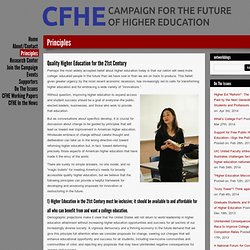
This belief, given greater urgency by the most recent economic recession, has increasingly led to calls for transforming higher education and for embracing a wide variety of “innovations.” Without question, improving higher education to expand access and student success should be a goal of everyone–the public, elected leaders, businesses, and those who work to provide that education.
But as conversations about specifics develop, it is crucial for discussion about change to be guided by principles that will lead us toward real improvement in American higher education. We simply cannot risk a return to earlier times when education was rationed on the basis of race and economic status. Commission on the Future of Higher Education. Secretary Spellings and former North Carolina Governor James B.
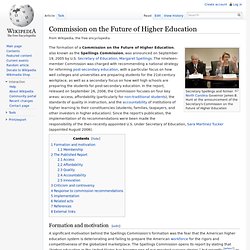
Hunt at the announcement of the Secretary's Commission on the Future of Higher Education The formation of a Commission on the Future of Higher Education, also known as the Spellings Commission, was announced on September 19, 2005 by U.S. Secretary of Education, Margaret Spellings. The nineteen-member Commission was charged with recommending a national strategy for reforming post-secondary education, with a particular focus on how well colleges and universities are preparing students for the 21st-century workplace, as well as a secondary focus on how well high schools are preparing the students for post-secondary education. Formation and motivation[edit] Ccrc.tc.columbia.edu/media/k2/attachments/aera-2013-sea-of-choices.pdf.
The Future Is Now: 15 Innovations to Watch For - Commentary. By Steven Mintz Profound transformations have reshaped the higher-education landscape in roughly 50-year intervals.
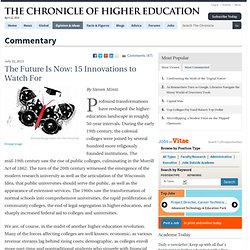
During the early 19th century, the colonial colleges were joined by several hundred more religiously founded institutions. 2013 Hottest E-Learning Trends [INFOGRAPHIC] Advances in technology generally define the latest trends in any industry, and the elearning industry is no different.
![2013 Hottest E-Learning Trends [INFOGRAPHIC]](http://cdn.pearltrees.com/s/pic/th/learning-infographic-learndash-59431183)
New devices and APIs are shaping the present and future of how organizations administer and record learning. In 2013, we are starting to see how the latest technologies are making their way into formal learning delivery. The infographic below, provided by KnowledgeOne, details some of the latest and emerging trends in 2013 as they relate to elearning. Some of the more significant trends include: Keys to Developing Higher Education Breakthrough Models. JOLT - Journal of Online Learning and Teaching. The Big Idea That Can Revolutionize Higher Education: 'MOOC' - Laura McKenna. Massive open online courses combine the best of college -- exceptional instruction -- with the best of technology -- online interactive learning.
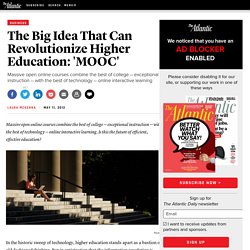
Is this the future of efficient, effective education? Reuters In the historic sweep of technology, higher education stands apart as a bastion of old-fashioned thinking. But in anticipation that the information revolution is coming for colleges, Ivy League colleges are competing to create online classes without the Ivy League price tag and without the Ivy League admission hurdles. In a recent article in the New Yorker, the President of Stanford, John Hennessy said, "There's a tsunami coming. " Daphne Koller, a professor of Computer Science at Stanford University and the co-founder of Coursera, a free online classroom, believes that Hennessy is right. Coursera is a massive online open classroom -- or MOOC -- that operates in conjunction with four top universities - Stanford, University of Pennsylvania, the University of Michigan, and Princeton.
Ultra-Affordable Online Courses and the Transformation of Higher Education. Ccrc.tc.columbia.edu.php53-12.dfw1-1.websitetestlink.com/media/k2/attachments/keeping-end-examining-improve.pdf. Change Magazine - January-February 2013. By Elizabeth D.
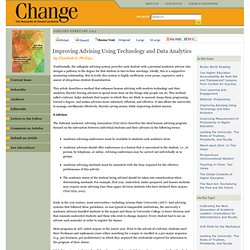
Phillips Traditionally, the collegiate advising system provides each student with a personal academic advisor who designs a pathway to the degree for that student in face-to-face meetings. Ideally, this is a supportive mentoring relationship. But in truth, this system is highly inefficient, error prone, expensive, and a source of ubiquitous student dissatisfaction. This article describes a method that enhances human advising with modern technology and data analytics, thereby freeing advisors to spend more time on the things only people can do. EAdvisor The National Academic Advising Association (NACADA) describes the ideal human advising program focused on the interaction between individual students and their advisors in the following terms: Academic advising conferences must be available to students each academic term.Academic advisors should offer conferences in a format that is convenient to the student, i.e., in person, by telephone, or online.
Choosing a Major Resource. Net.educause.edu/ir/library/PDF/ELI3028.pdf. The future of higher education is debatable. New learning platforms driven by technology promise to make college learning less expensive and more accessible, but some say those radical changes could topple higher education’s traditional model.
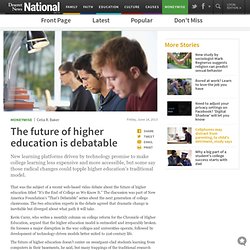
That was the subject of a recent web-based video debate about the future of higher education titled “It’s the End of College as We Know It.” The discussion was part of New America Foundation’s “That’s Debatable” series about the next generation of college classrooms. The two education experts in the debate agreed that dramatic change is inevitable but diverged about what path it will take. Kevin Carey, who writes a monthly column on college reform for the Chronicle of Higher Education, argued that the higher education model is outmoded and irreparably broken. He foresees a major disruption in the way colleges and universities operate, followed by development of technology-driven models better suited to 21st-century life. MOOC metamorphosis. The Future Of The College Experience: Lowering The Debt To Party Ratio. Net.educause.edu/ir/library/pdf/ELI7096.pdf. Ccrc.tc.columbia.edu.php53-12.dfw1-1.websitetestlink.com/media/k2/attachments/college-readiness-postsecondary-perspectives.pdf.
EDUCAUSE Live! 2013/01/23.